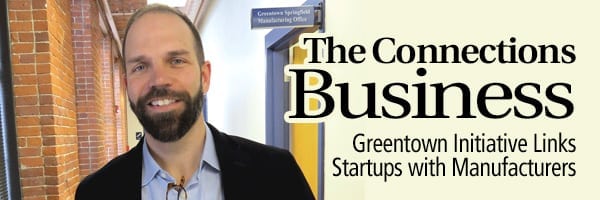
Greentown Initiative Links Startups with Manufacturers
The ‘Connections’ Business
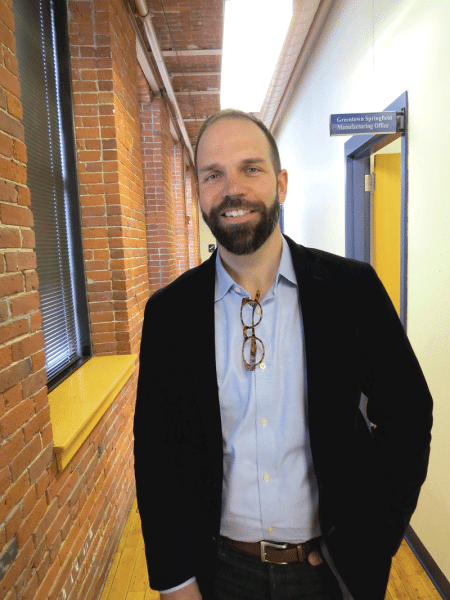
Adam Rodrigues
Adam Rodrigues, manufacturing fellow with Greentown labs, says his job description can be smashed down to two words: Making matches. That would be matches between startups across the state, and especially those within the 413, and manufacturers in Western Mass. that can help bring a concept to the marketplace. He’s already made several of these matches and plans to make many more, connections that have a number of benefits — for the startups, the manufacturers, the region, and the state.
Adam Rodrigues has a nice, large office in Building 101 at the Technology Park at Springfield Technical Community College.
But it’s sparse, and, therefore, a little awkward.
“I’ve got about half a basketball court and just this little desk in the back right corner,” he said with an obvious nod to the office’s well-polished hardwood floors, a holdover from the days when this building was part of the Springfield Armory complex. “It’s a little weird.”
But it’s all good, because Rodrigues isn’t in his office or at that desk very much. No, he’s paid to be on the road, actually, and that’s where he spends almost all his time.
As a manufacturing fellow with Greentown Labs — or, to be more specific, Greentown Learning, a spinoff off the Somerville, Mass.-based clean-technology incubator — his job is to make meaningful connections between as many startups and Bay State-based manufacturers, and preferably Western Mass. manufacturers, as possible.
“I’m a matchmaker,” he said, adding that this role cannot be carried out effectively from Suite 32 in Building 101 — although he can do some paperwork there. The real work is carried on in a host of other settings. They range from area manufacturing facilities — he’s visited several dozen by his count — to various programs put on Valley Venture Mentors (VVM), SPARK, and other groups focused on encouraging and mentoring entrepreneurs; from structured meet-and-greet sessions between startups and manufacturers to what amount to organized road trips during which those incubating at Greentown get introduced to manufacturers who might make their concept a reality.
And there is much that goes into that last equation, he said, adding that a manufacturer can help an entrepreneur take an idea, maneuver it through the prototyping stage, make tweaks and improvements, and finally move it to the production phase.
And that’s exactly what’s happening — note the present tense — with a company called Quikcord, its principals, Matt Fioretti and Matt Adams, and East Longmeadow-based Toner Plastics.
Fioretti didn’t want to say much at all about his concept, intended for the military, until it reaches the market — “let’s just say it’s a product designed by a Marine for Marines” — but talked enthusiastically, and at length, about how Greentown’s efforts to match the company with Toner Plastics are helping to propel this venture forward.
“It’s had an unbelievable springboarding effect,” he explained. “Greentown was able to put us in front of the right people, and it just skyrocketed us to the point we’re at.
“And the best part about is that the amount of money we spent is next to nothing when you think of what we’ve accomplished,” he went on. “We’re two guys with an idea and no money, and we’re almost ready to do a short production run.”
Such a scenario, and such commentary, is exactly what several partners had in mind roughly 15 months ago when Greentown’s Western Mass. facility was created, with Rodrigues, a veteran of the industry having worked for several years at Lenox, at the helm.
When the initiative was launched, there were goals and benchmarks set, he said, adding that most all of them have been exceeded. Here are some of the numbers to date:
• More than 50 manufacturers have been identified as interested in working with hardware startups;
• More than 45 startups have received assistance from the initiative;
• More than 80 connections have been made between hardware startups and Western Mass. manufacturers;
• More than 30 east-west connections have been made between Boston-area startups and Western Mass. manufacturers; and
• Perhaps most importantly, five contracts have been signed between startups and Western Mass. manufacturers.
All of this translates into thousands of miles on Rodrigues’ odometer and comparatively few hours sitting behind that small desk. But, as noted, this is how those behind Greentown’s Springfield facility drew up this play, and thus far, it is netting real results for the region.
For this issue and its focus on entrepreneurship, BusinessWest looks at Rodrigues’ matchmaking work to date and how it has become another key ingredient in the region’s broad economic-development strategy.
Making Introductions
As he flashed back several months and retold the story of how the company that would become Quikcord became matched with Toner Plastics, Fioretti provided a textbook example of how Greentown Learning works and why it was created.
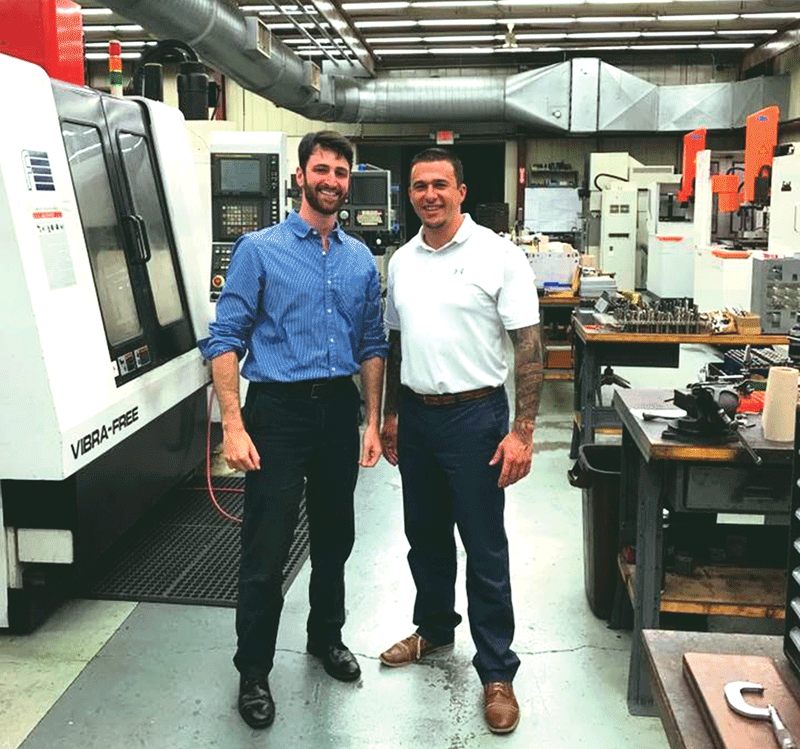
Matt Fioretti, left, and Matt Adams, cofounders of Quikcord, were successfully matched with Toner Plastics, enabling their concept to take big steps forward.
“We were at a VVM event, and we were making a pitch on our basic concept,” he recalled. “We had nothing; we just had a concept. Well, after we made the pitch, there were some breakout sessions where people come and talk with you about what they just heard. And Adam [Rodrigues] came up to us and said, ‘I’m just getting started, I don’t even have business cards, but let me get your names and e-mail addresses, and I’ll get back to you.’
“He then said, ‘this is going to be worth it for you,’” Fioretti went on, remembering that commentary because of its poignancy. “And at that stage, we were ready to try just about anything. So we said, ‘sure.’”
Fast-forwarding a little, he said Rodrigues did, indeed, follow up a few weeks later. They met and talked about their concept and also about Greentown. Later, Rodrigues arranged for the partners to pitch at a manufacturing seminar staged by Greentown and the Massachusetts Manufacturing Extension Partnership.
One of the panelists they pitched to was Steve Graham, owner of Toner Plastics. Fast-forwarding some more, he said Graham and the team at Toner took an interest in the product and provided several different kinds of support to move the concept forward.
“They recognized that we were a small business without much capital, but they loved the idea,” said Fioretti. “And they did a lot of work for us pro bono; and they got us from to the point where we could take our concept to CAD [computer-aided design].”
Again, this is exactly the script those behind Greentown Learning had in mind, said Rodrigues, adding that the need for such a matchmaking outfit, if you will, had become increasingly apparent in recent years.
Especially at Greentown Labs, the largest clean-technology incubator in the country, with more than 60 hardware startups under that one large roof.
“As they started to incubate these startups, they realized that, while they had all these awesome ideas coming out of the state, they did not have a good link to manufacturers in the Commonwealth,” he explained, adding that, to address this, a manufacturing initiative was launched to help connect the startups with Bay State manufacturers.
Progress was made, he went on, and it quickly became apparent that attention needed to be focused on the western part of the state, not only the manufacturers that give the region much of its economic heritage, but the ever-increasing number of startups being spawned there as well.
So a position, funded by the Davis Foundation, the Massachusetts Clean Energy Center, and MassDevelopment, was created, and Rodrigues started filling the drawers in that desk in January 2017.
He said he hit the ground running, and hasn’t stopped running. He had a good foundation on which to build, having been part of VVM’s manufacturing accelerator in 2016, serving as a mentor to the participants, passing on knowledge gained while working at Lenox in the supply-chain realm.
“Being a buyer, I was able to tell the manufacturers that were in the accelerator what a buyer is looking for when they’re working for new contracts,” he explained, adding that he had also taken part in several of VVM’s monthly gatherings at which entrepreneurs make pitches, make connections, and hopefully take steps forward.
So he knew both of the constituencies he would be working with in his capacity with Greentown. Sort of, but not as much as he would like. So he sent about making connections of his own.
“My goal was to meet as many manufacturers as I could in this area, and meet as many startups as I could in this area that were developing actual hardware, and try to connect them,” he told BusinessWest.
These connections usually come about, as noted earlier, through organized events, such as a Shark Tank-like gathering involving entrepreneurs pitching to manufacturing experts.
“Each startup would get on stage and say, ‘this is what I’m making, here’s where we’re hung up, here’s where we don’t know how to scale,’” he noted. “And then we’d have the manufacturers from this area there to say, ‘I’ve seen this before; here’s what I think you should do,’ and someone else would chime in with ‘have you considered doing this?’ And the startups walk away with a connection to manufactuters.”
Creating Progress
And the importance of these connections — to the startups, the manufacturers, the region, and the state itself — cannot be overstated, he went on, adding that they add up to potential opportunities that might be otherwise be missed.
Elaborating, he said part of this equation is a simple matter of awareness, or a lack thereof, as the case may be. Indeed, some entrepreneurs simply don’t know what the region’s manufacturers possess when it comes to capabilities and specialties, and often look overseas for someone to make their product.
“We want to raise a flag,” noted Rodrigues, “and say, ‘before you decide to manufacture somewhere else in this country, before you go China to have that prototype made, let me introduce you to a few people here who can help you out.”
But there is another element to these matchmaking efforts, perhaps one that’s even more important, he went on.
“Sometimes, in addition to making a connection, the entrepreneur will walk away with a completely new direction for the company and the design process,” said Rodrigues, adding that this is exactly what has happened with some of the connections he’s helped orchestrate.
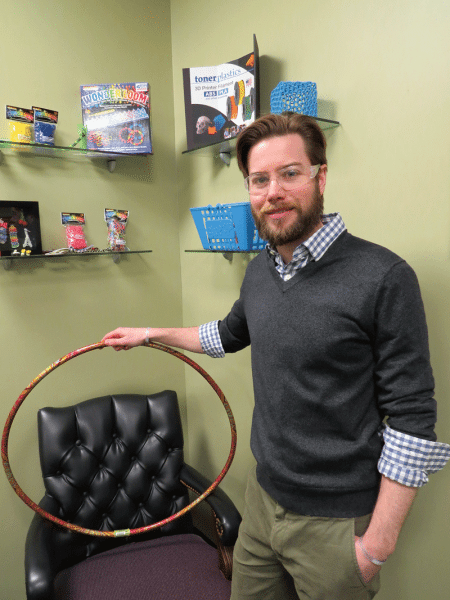
Mike Reed, seen here in the Toner Plastics lobby with some of the products produced there, including the hula hoop, says the company was able to help Quikcord reach the prototype stage.
Such as the one involving Quik-cord and Toner Plastics. Summing up how that worked out succinctly, and colorfully, Rodrigues noted that, “at the initial event, their prototype was a toilet-paper roll with duct tape on it; a few months later, they had a an actual, fully formed prototype with the logo on it, and they were ready for manufacturing.”
Spearheading that transformation was the team at Toner Plastics, a 25-year-old manufacturer of extruded products and a leader in 3D printer filament products and makers of, among other things, hula hoops. Among its many other specialties is manufacturing filler for wire and cable products.
Mike Reed, the company’s engineering manager, said Steve Graham saw potential in the Quikcord concept and its principals and agreed to work with the entrepreneurs to help move their idea off the proverbial drawing board.
“At that point, they had a good concept, but they really needed some help finalizing the design and getting to manufacturing,” Reed explained, adding that Toner Plastics worked on the project in conjunction with its sister company, Modern Mold and Tool, and especially design engineer Stefan Ogle. “We worked with them for several months on the design; we went back and forth, made several revisions, and did some prototype work as well. And then we optimized that design for manufacturing.”
These were critical steps forward, ones that prompted Fioretti to use that phrase ‘springboarding effect’ to capture how this connection gave the venture some needed lift.
“We should have the final product in hand soon,” he went on, adding that the company is close to moving on to the manufacturing stage, and he expects Toner Plastics to play a big role in that work. “We love what Greentown is doing because we’ve seen first-hand how it works.”
There are other startups that can make that same claim, said Rodrigues, including Kwema, a Cincinnati-based wearable-technology startup that had participated in the VVM accelerator and also in the same ‘rocket pitch’ where Quikcord met Toner Plastics.
“When they got exposed to what’s out here for manufacturing and they started working with Worthington Assembly, they now have plans to relocate their headquarters from Cincinnati to Springfield,” said Rodrigues.
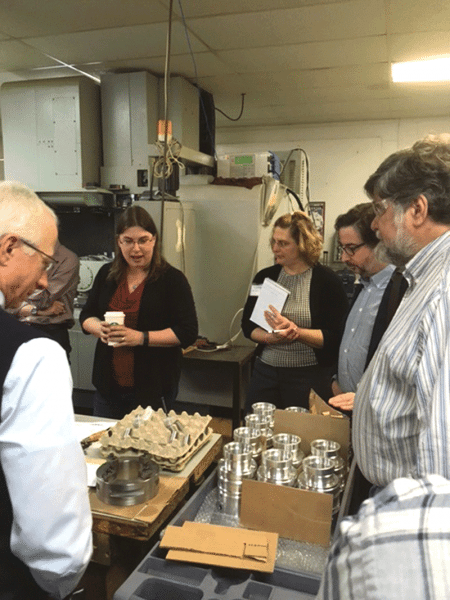
As part of his matchmaking efforts, Adam Rodrigues has been introducing startups to area manufacturers at tours, such as this one at Peerless Precision in Westfield, led by company president Kristin Carlson.
Still another success story is RiseRobotics, a company incubating at Greentown in Somerville, that has made not one but a few of the east-west connections Rodrigues said he loves to facilitate. Indeed, the company is now working with two Westfield-based manufacturers, Peerless Precision and Manufacturing Technology Group.
The goal moving forward, obviously, is to make more of these connections, said Rodrigues, adding that he’s only 15 months into a three-year contract and is already exploring funding options to extend the life of this important initiative.
“There’s some nice momentum going — the numbers are well beyond anything we could have projected,” he said of the initiative’s track record to date. “What that means to me is that people are excited about this; they’re excited about the whole innovation movement that’s going on in this area.
“The numbers show there’s a lot of potential here,” he went on. “Manufacturers are thinking about the future, and they’re thinking about innovation, and the exposure to what Massachusetts has to offer to innovators is changing the perception that they have to go to China first.”
Prototype for Success
As he talked with BusinessWest in Building 101 and posed for a few photos, Rodrigues admitted he didn’t know too much about what was going on within the facility still known as the Scibelli Enterprise Center, named for the former STCC president who created it.
He did know there are few businesses incubating there, and that there are some economic-development-related agencies leasing space, such as Leadership Pioneer Valley and the Western Mass. Small Business Development Center.
He knows those two because he’s worked directly with the latter as part of his connection-making efforts, and the former occupies the suite next door.
Other than that … he doesn’t know very much, because he’s not there, in his half-basketball court, very much at all.
His job is to be on the road, making connections, building bridges, whatever phrase you want to use. And there is still considerable work to do in that regard.
George O’Brien can be reached at [email protected]




